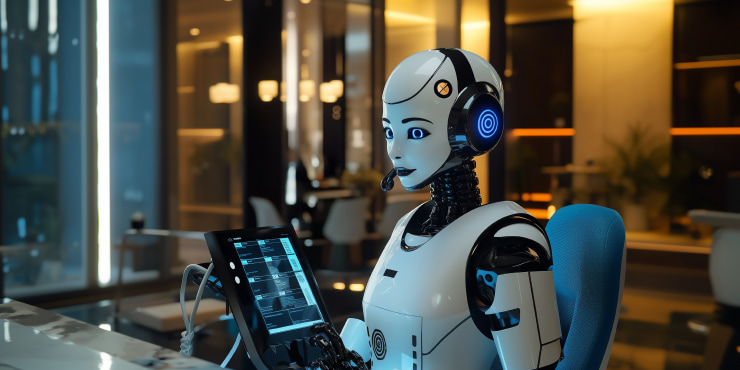What is a Virtual Receptionist? Enhancing Business Efficiency with AI Technology

Imagine a world where your everyday tasks are automatically performed. Meaningful business decisions are instantly made based on analyzing massive amounts of data. Just imagine learning becoming personalized and maximized. This world has already arrived thanks to artificial intelligence (AI) and neural networks. Their impact on employment is generally multifaceted and requires an integrated approach. This is important on the part of business and government. This approach is essential to minimize negative effects and maximize positive effects.
AI and neural networks offer huge potential for business, work and everyday life. It is important to understand their capabilities and apply them to improve the quality of life. Robotic technologies are still needed to improve efficiency. Do you know what a virtual receptionist is? Today, we are going to talk about it. Businesses aim for scalability and superior client service. AI receptionists are critical tools. They maintain seamless communication and boost overall productivity. Let’s discuss all the nuances.
Understanding the Role of a Virtual Receptionist
Virtual receptionists are AI-driven or remote professionals. They manage front-office tasks for businesses without being physically present. They are pivotal in ensuring smooth communication with customers. These services handle essential tasks efficiently.
Let's discuss the virtual receptionist definition. This is a service that manages business communication remotely. It performs duties similar to an in-house receptionist. This happens with enhanced flexibility and scalability.
Here are the key functions of a virtual receptionist service:
- Handling Calls: The robotic administrator answers incoming calls. It routes them to the appropriate departments or personnel.
- Scheduling: Virtual assistants book appointments. They update business calendars in real-time.
- Providing Information: AI-driven receptionists offer answers to frequently asked questions. They share business-related details.
- Message Taking: Virtual receptionists document messages. It ensures they reach the intended recipients promptly.
- Order Processing: In some cases, AI receptionists can process orders. They may manage reservations for businesses.
How does AI technology power virtual receptionists? Let's discuss:
- Speech Recognition and Natural Language Processing (NLP): AI receptionists include them. They can understand and respond to client inquiries more effectively.
- Automation: Routine tasks such as call forwarding or appointment confirmations are typically handled seamlessly. It reduces wait times.
- Availability: AI solutions offer 24/7 service. They ensure uninterrupted client communication.
- Human-like Interactions: Advanced AI receptionist solutions can mimic human behavior. They provide a personalized experience.
Automation and digital communication have many benefits:
- Increased Efficiency: Automation software reduces manual errors. It also speeds up processes.
- Cost-effectiveness: Virtual agents eliminate the need for full-time, in-house staff.
- Scalability: Businesses can handle fluctuating call volumes without additional hires.
- Improved Customer Experience: Faster response times increase satisfaction and retention rates.
With these capabilities, AI receptionists empower businesses to provide exceptional service. They optimize operational efficiency.
Key Features of Virtual Receptionists
AI receptionists play a crucial role in managing business communication and client interactions. What does a virtual receptionist do? What key features do they offer? Here is a breakdown:
- Call Handling: Virtual receptionists answer and route incoming calls to the appropriate person or department. AI-powered receptionists use NLP to identify caller intent and provide relevant responses.
- Appointment Scheduling: Manage calendars and book appointments in real-time. Automated reminders can generally be sent. It helps to reduce no-shows and improve appointment management.
- Answering FAQs: Virtual reception services provide instant responses to common inquiries. They use machine learning and pre-programmed answers. AI systems continuously improve their responses based on past interactions.
- Message Forwarding: AI receptionists create and document messages accurately. They ensure prompt delivery to the intended recipient. They can do this even during after-hours.
How does AI enhance these features? Let's discuss:
- Machine Learning: It enables the system to adapt and improve over time.
- NLP: NLP helps virtual receptionists understand complex customer requests.
- Real-time Responses: Instant communication between these technologies ensures faster service. It also leads to better customer satisfaction.
Virtual receptionists streamline business communication with many advanced features. They include call handling, appointment scheduling, message forwarding, and answering FAQs. These automated systems provide real-time responses. They ensure seamless customer interactions, even during peak business hours. Such systems leverage NLP and machine learning. They adapt to customer preferences over time. AI receptionist systems offer personalized experiences. AI receptionists enhance overall operational efficiency. They ensure superior service quality and consistent customer satisfaction across industries.
Comparing Virtual Receptionists to Traditional Receptionists
We will discuss the differences between AI-powered and traditional human receptionists. They focus on cost-effectiveness, scalability, and efficiency. Let’s explore some pivotal points:
| Aspect | Traditional Human Receptionists | AI receptionists |
| Cost-Effectiveness | Requires full-time salaries, benefits, and office space. | Lower operational costs with subscription or pay-as-you-go models. |
| Availability | Limited to working hours and breaks. | 24/7 availability for uninterrupted customer service. |
| Scalability | Adding staff for increased demand is costly and time-consuming. | Easily scalable to handle fluctuating call volumes. |
| Call Handling | Dependent on human availability and multitasking. | The online receptionist handles multiple calls simultaneously. It happens with instant responses. |
| Appointment Scheduling | Manually managed with room for human error. | Automated, real-time scheduling and reminders with minimal errors. |
| Answering FAQs | Based on personal knowledge and memory. | Machine learning enhances FAQ accuracy and responses over time. |
| Message Forwarding | Dependent on manual note-taking and follow-up. | Immediate message forwarding with detailed documentation. |
| Training and Adaptation | Time-intensive to train new staff. | AI systems adapt and improve continuously without formal retraining. |
| Client Experience | Offers personalized, empathetic interaction. | It can mimic human-like responses but may lack emotional nuance. |
Virtual receptionist services offer a scalable alternative to traditional receptionists. They help businesses stay efficient and competitive.
How AI Technology Enhances Virtual Receptionist Capabilities

AI-driven online receptionist services leverage advanced technologies. They help streamline communication and improve client service. Here are the key technologies that make AI receptionists effective:
- Speech Recognition: Converts spoken words into text for accurate call handling and documentation. It enables AI receptionists to understand accents, tones, and languages. Speech recognition enhances accessibility for a broader client base.
- Automation: This technology automated call routing, appointment booking, and sending reminders. It reduces manual errors and speeds up processes for better efficiency.
- NLP: It helps virtual receptionists' services understand and interpret client inquiries. This is possible even with varying phrasing. NLP allows the system to provide appropriate responses and route calls efficiently.
- Machine Learning: Learning from past interactions continuously improves response accuracy. Technology enables the AI receptionist to adapt to business-specific terms and client preferences.
AI receptionist systems are highly advantageous across various industries. They significantly improve accuracy and decision-making processes. AI is revolutionizing operations. It automates tasks, analyzing vast data sets, and providing insightful predictions. Virtual receptionists reduce human error and support organizations in achieving their goals. Let’s explore how AI can benefit different sectors:
- Healthcare: Manage appointment scheduling, patient reminders, and follow-ups.
- Legal Services: Answer inquiries, schedule consultations, and forward urgent messages.
- Real Estate: Handle property inquiries, book tours, and manage client follow-ups.
- E-commerce: Provide instant responses to FAQs and assist with order management.
AI technology empowers AI receptionists to handle complex tasks easily. It ensures businesses stay competitive and deliver exceptional client service.
The Role of Machine Learning in Virtual Receptionist Performance
Machine learning is critical in enhancing the capabilities of an automated receptionist. It enables continuous improvement in understanding and responding to customer inquiries. Here’s how it works:
- Improved Understanding of Client Queries: Machine learning enhances this aspect. It allows the automated receptionist to analyze past interactions. Machine learning also helps to recognize patterns in client behavior and requests. Over time, it becomes better at handling complex or varied inquiries. This happens even if phrased differently.
- Continuous Learning: The system refines responses by learning from each client interaction. It adapts to new terms, preferences, and trends. This reduces errors and increases the accuracy of responses.
- Personalized Client Experience: Machine learning tracks their preferences and helps tailor interactions to meet individual needs. For example, frequent callers can be typically recognized. They may be provided with customized greetings or faster access to their preferred services.
- Enhanced Efficiency: Virtual reception system automates responses to common inquiries. It allows businesses to focus on high-priority tasks without sacrificing client service quality.
Machine learning transforms AI receptionists into dynamic, adaptable tools. They improve business communication and create more personalized client experiences over time.
Natural Language Processing and Customer Interaction
NLP is a branch of AI. It enables machines to understand, interpret, and respond to human language. NLP is vital in enhancing the performance of an AI phone receptionist. It improves its ability to handle conversations naturally and efficiently. How does NLP benefit virtual receptionists? Let's explore:
- Accurate Speech Interpretation: NLP allows the AI receptionist to comprehend nuances. There are various accents and colloquialisms. It can process written and spoken language. NLP ensures accurate responses to diverse customer queries.
- Contextual Understanding: NLP helps AI receptionists go beyond simple keyword detection. It analyzes the context of a conversation. This enables more relevant responses and improved customer satisfaction.
- Smooth, Human-Like Conversations: NLP mimics human speech patterns. It makes interactions feel more natural and less robotic. NLP can seamlessly handle interruptions or changes in conversation flow. It is much like a human receptionist.
- Real-Time Responses: NLP-powered receptionists process information instantly. It delivers immediate and accurate responses. This reduces wait times and keeps customer interactions efficient.
- Continuous Improvement: NLP enables the AI phone receptionist to refine its responses. This happens by analyzing past conversations. NLP helps adapt to customer preferences over time.
There are many benefits for businesses:
- Scalability: NLP allows the AI voice receptionist to handle more inquiries. It happens without sacrificing service quality.
- Enhanced Customer Experience: Smooth, conversational interactions increase customer satisfaction and retention.
- Higher Efficiency: Faster response times and fewer communication errors improve operational productivity.
NLP transforms AI receptionists into highly effective communication tools. They ensure businesses can offer superior service and maintain seamless customer interactions.
Benefits of a Virtual Receptionist for Businesses
Implementing a virtual receptionist can significantly enhance business operations. It reduces costs and improves client service. Here’s a breakdown of the benefits of virtual receptionist services:
- Reduced Overhead Costs: Businesses save on salaries, benefits, office space, and training costs. Virtual receptionist software offers affordable subscription models with scalable pricing.
- 24/7 Availability: AI receptionists provide round-the-clock service. They ensure clients can reach the business anytime. This increases accessibility and enhances customer satisfaction.
- Accurate Communication: Digital reception software ensures every call is consistently handled. It guarantees important messages are accurately documented. AI systems reduce human errors that can occur with traditional receptionists.
- Scalability: Businesses can easily adjust the service to handle fluctuating call volumes. It happens without hiring more staff. Scalability is ideal for companies experiencing seasonal demand or rapid growth.
- Increased Efficiency: Call handling, appointment scheduling, and message forwarding are fully automated. They free up staff to focus on core activities. AI voice receptionist systems handle multiple calls simultaneously. They reduce missed opportunities.
- Industry-Specific Benefits: Medical practices efficiently manage patient appointment scheduling, reminders, and follow-up calls. Legal Firms answer inquiries, book consultations, and forward urgent messages promptly. Retail handles order inquiries and processes returns. It also provides instant FAQ responses for better customer support.
- Personalized Client Service: Machine learning allows AI receptionists to adapt to customer preferences. It also helps them provide tailored experiences. Repeat clients can be immediately recognized for more personalized interactions.
- Business Continuity: In case of unexpected disruptions, AI receptionists ensure continuous communication. They minimize downtime.
Businesses should consider adopting digital reception software solutions. They can streamline operations, improve service quality, and focus on their core activities. Such solutions enhance customer experiences across various industries.
Challenges of Implementing a Virtual Receptionist and How to Overcome Them

Adopting an AI reception system offers significant advantages. Businesses may face some challenges during implementation. Here's a look at these hurdles and how to overcome them:
- Technical Integration Challenges: Integrating virtual receptionists with existing communication systems and platforms can be complex. Choose software that supports seamless integration with your current tools such as CRMs and scheduling apps. Work with providers offering robust technical support and training.
- Customer Trust and Adaptation: Clients may prefer human interaction over a virtual reception. They also can doubt the reliability of automated systems. Use a system with natural language processing (NLP) for smooth, human-like conversations. Inform customers about the capabilities of the virtual office reception. Emphasize its benefits, such as faster responses and 24/7 availability.
- Maintaining a Personal Touch: Automated systems may lack the empathy and warmth of human receptionists. Implement digital receptionist software with machine learning. It helps to adapt to client preferences over time. Customize greetings and interaction flows to reflect the business's brand personality.
- Cost of Implementation: Upfront investment in a virtual reception system may seem high. It seems so, especially for small businesses. Find affordable subscription-based models that scale as the company grows. Start with essential features and upgrade gradually as needs evolve.
- Resistance from Staff: Employees may worry about job displacement. They can struggle to adapt to new systems. Emphasize that the AI reception complements staff. It automates routine tasks. It allows them to focus on high-value activities. Provide training to help staff leverage the new system effectively.
- Ensuring Reliability and Security: Concerns about system downtime or data breaches can arise. Select a reputable provider. It must offer high uptime guarantees, strong encryption, and regular system updates. It helps to ensure reliability and data security.
Businesses must proactively address these challenges and select the right digital receptionist software. They can ensure a smooth transition to a virtual system. It enhances efficiency and maintains excellent customer service.
The Future of Virtual Receptionists in Business Operations
The future of virtual reception is closely tied to advancements in AI technologies. They will continue to enhance their capabilities and redefine business operations. Here are some key trends to watch for in the coming years:
- Improved AI Interfaces: Virtual office reception will offer even more intuitive interfaces. They make them easier for businesses to configure and customize. Integration with CRM and helpdesk software will become more seamless. It creates unified communication ecosystems.
- Emotion Detection: Mood-sensing capabilities will allow AI receptionists to detect customer emotions. It will be possible through voice tone and language. This will help systems adjust responses based on customer sentiment. AI improves the customer experience. It offers empathetic, contextually aware interactions.
- Advanced Voice Recognition: Future digital receptionist software will feature more sophisticated voice recognition. It can understand a wider range of accents, dialects, and languages. This will make it easier for businesses to serve diverse, global customer bases. Voice recognition maintains accuracy and speed in communication.
- Increased Automation of Routine Tasks: As AI technology advances, virtual receptionists will take on an even more significant role. They will automate call handling and scheduling. AI receptionists will automate customer service inquiries, billing, and data entry tasks. This will allow businesses to increase efficiency and focus on higher-value activities.
- Enhanced Personalization: Virtual reception will offer increasingly personalized services. They will leverage improved machine learning and better data analytics. AI receptionists will recognize returning customers and anticipate their needs. This will create more tailored experiences. Virtual receptionists foster long-term client relationships.
Successful trials show that AI technologies have significant potential. It is important for driving innovation and economic development. The use of AI receptionists is becoming a key success factor in modern business. It helps businesses to take a leading position in the market. Also, they are able to achieve stable growth in the future. Follow Newo.ai to keep updated with the latest news.


